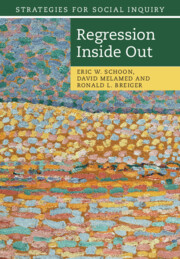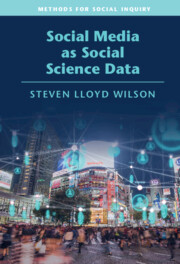Regression Inside Out
Linear regression analysis, with its many generalizations, is the predominant quantitative method used throughout the social sciences and beyond. The goal of the method is to study relations among variables. In this book, Schoon, Melamed and Breiger turn regression modeling inside out to put the emphasis on the cases (people, organizations, and nations) that comprise the variables. By re-analyzing influential published research, they reveal new insights and present a principled way to unlock a set of more nuanced interpretations than has previously been attainable. The emphasis is on intuition and examples that can be reproduced using the code and datasets provided. Relating their contributions to methodologies that operate under quite different philosophical assumptions, the authors advance multi-method social science and help to bridge the divide between quantitative and qualitative research. The result is a modern, accessible, and innovative take on extracting knowledge from data.
- Expands what can be learned from regression models by fundamentally rethinking how we learn from them
- Significantly alters the way in which statistical analysis is done through the introduction of methodologies that operate under quite different philosophical assumptions
- Includes access to a downloadable R package and R scripts for all the replication code and data analyses in the book, allowing you to follow the approach and apply it to your own research projects
Reviews & endorsements
‘A book of wisdom and insight that will lead even seasoned quantitative researchers to have a deeper grasp of their own methods, provides a continual stream of ‘ah-ha!’ experiences, and a bold argument about how to go forwards. Not to be missed!’ John Levi Martin, Professor, Department of Sociology, University of Chicago
‘This outstanding book represents a principled way of taking the ideas we’re used to and helping us answer the questions we really want to answer - rather than the ones we think we can answer. It brings a deeply sociological lens to a ‘basic’ tool in a way that will help push substantive thinking in quantitative methods.’ James Moody, Robert O. Keohane Professor of Sociology, Duke University
‘Regression Inside Out ingeniously takes us under the hood of regression models to show how much more we can learn from them when we think relationally and consider cases and variables as co-constitutive for their outputs. Not only does it elegantly enhance our toolkits, it also brilliantly builds bridges between seemingly disparate methodological approaches. This theoretically deep yet very accessible book is an absolute must-read for anyone conducting regression analysis and for anyone thinking about multi-method research.’ Sophie Mützel, Professor of Sociology, University of Lucerne, Switzerland
‘[T]his text combines ingenuous ideas, uncompromising rigor, and intuitive accessibility. I highly recommend this book to data analysts and statistical practitioners. Its innovative approach and rigorous analysis offer valuable insights that can transform how we interpret regression models.’ Jun Xu, Social Forces
Product details
March 2024Adobe eBook Reader
9781108897365
0 pages
This ISBN is for an eBook version which is distributed on our behalf by a third party.
Table of Contents
- 1. Regression inside out
- Part I:
- 2. OLS inside out
- 3. Generalizing regression inside out
- 4. Turning variance inside out with Eunsung Yoon
- Part II:
- 5. Action detection
- 6. Interaction detection
- Part III:
- 7. RIO as a gateway to case selection
- 8. RIO as a gateway to configurational comparative analysis
- 9. RIO as a gateway to field theory
- 10. Conclusion
- Appendix A: A brief introduction to matrices and matrix multiplication
- Appendix B: Computation of the singular value decomposition (SVD)
- Appendix C: Variance for binomial and count outcomes
- Appendix D: Compositional effects in using RIO to detect statistical interactions
- Appendix E: Monte Carlo simulation detecting interactions by regressing on rows of P.




